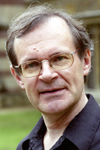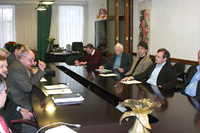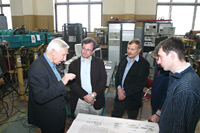Director's Corner
6 April 2006

Barry Barish
The Russian Federation in Seven Days
Today's issue features a Director's Corner from Brian Foster, GDE Regional Director of Europe.
It is widely known that the Russian Federation is home to a large number of prestigious accelerator laboratories and many highly regarded accelerator scientists. Somehow the 30 years of my particle physics career had not produced an excuse to discover this for myself, so I was very glad on a personal level finally to rectify this last month during a 7-day trip.
It was a rather hectic visit, not helped by leaving my now-unfamiliar paper airline tickets at Heathrow. I arrived in St Petersburg and visited Gatchina, then on to Novosibirsk to visit the Budker Institute, to Moscow and Protvino, ITEP, INR at Troitsk and finally JINR at Dubna. This is an average of more than one accelerator a day (several institutes have more than one!) and so necessarily my impressions could only be relatively superficial. Those impressions were however strong: a sense of awe that so much excellent work is still going on under very difficult economic circumstances; the inventiveness of the scientists in finding ways to generate funds for research by activities in the commercial sphere; the excellence of the accelerator physics ideas regularly being generated. While some of the institutes were more interested and had more expertise in detector development, all expressed enthusiasm for a greater level of involvement with the ILC and in particular engagement with the GDE in areas where the European effort is urgently in need of strengthening. Perhaps the institute with the greatest enthusiasm and the most ambitious plans was JINR at Dubna. Recently designated one of only six Special Economic Zones by the Russian government, Dubna is a hive of activity, with plans for new science parks, new bridges and infrastructure, a massive conference centre etc. The new Director, A. Sisakian, is determined to revitalise JINR’s international mission and to work enthusiastically on ILC preparation. With all the institutes I discussed concrete plans to increase their engagement with the GDE which will hopefully develop in the coming months.
My trip leaves me with many personal memories, most strongly the immense hospitality of my hosts, for whom no task was too much trouble; the elegance and beauty of St. Petersburg by night; Spring arriving overnight in the snowfields of Novosibirsk; the poignancy of the stacks of UNK magnets stored at Protvino; the beauty of the Kremlin and St Basil's Cathedral in the evening when I managed to play truant for 2 hours and find my own stumbling way from ITEP to the centre of Moscow and back via the excellent Moscow Metro; the colossal statue of Lenin staring over the Volga at Dubna; and last but not least the magnificent lunches and dinners interspersed with the requisite number of toasts in the excellent vodka provided by my hosts! Russia is certainly a country on the move, with a tradition in particle physics and accelerators second-to-none. I look forward to their increasing involvement with our exciting adventure of the ILC.
-- Brian Foster

